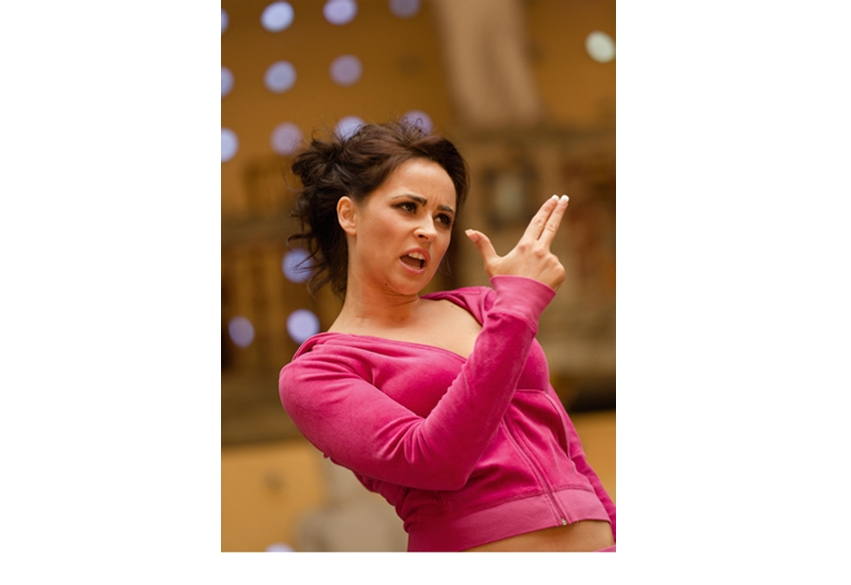Once or twice a season Shakespeare gets booted out of the Globe. In his place a modern author is given a chance to shine. The Scottish writer Chris Hannan’s new play, The God of Soho, opens with a frolicsome nod to classicism. We are in heaven where two demotic deities, Mr and Mrs God, engage in caustic marital banter. Mrs God wears a colostomy bag and her affliction triggers many a harrumphing sound of flatulence from an on-stage tuba. This is hilarious, of course, and even more hilarious if you happen to be six years old. Hannan’s carping immortals turn out to be very hard to engage with. Perhaps he assumed that divinities would be fun to write. But they’re devilishly hard, bordering on the impossible. Nothing is at stake in heaven. Learning, spiritual growth, redemption, alteration, all these psychological possibilities are denied to those outside the bounds of human existence.
Sure enough Hannan quickly tires of paradise and, after an impenetrable narrative twist, drops us into present-day London where we visit the Groucho Club. Here a gang of pompous, brattish starlets strut around swearing a lot and pursuing the predictable goals of fame, money and coked-up sex. Alas, these narky little twits are even harder to like than the gods. Their testy, wrathful banter is artless and unmusical, and their romantic attachments, which change with channel-flicking frequency, are impossible to latch on to.
The Globe crowd seemed delighted by the show’s trashy material and populist idiom. And some observers will salute the unstuffy decision to examine London’s youth culture through the eyes of a Scottish dramatist who is, let us not forget, still only 53 years old. But others will find the show stale, culturally tuneless and faintly voyeuristic. The production is saved from disaster by a genuinely funny scene in which two celebrities copulate while engaging in bored conversation. Otherwise, the play’s message seems to be that glib, superficial morons are glib, superficial and moronic. After watching 150 minutes of strenuous inarticulacy I felt I deserved a bit more.
The annual point-to-point from Edinburgh to the West End has finished. And the winner is Ruby Wax. Her touring show Losing It has arrived at the Duchess and it takes us into the dark heart of Ruby’s continuing struggle with depression. On stage, she’s a delight. Her lacerating charm and twinkly bitchiness never fail. And she’s accompanied by a pianist, Judith Owen, who adds tinkling musical textures and the occasional rehearsed aside. At the close, she’s permitted to sing one of her songs. In truth, her contribution is a bit odd. But never mind.
Here’s Ruby reminiscing about life: ‘I was tormented at high school because my front teeth were in another time zone.’ On equal rights at work: ‘It’s easier for men because they can still get voted on to the board even after they’re dead.’ On growing old: ‘If anyone ever helps me across the road I’ll beat him senseless with my Zimmer frame.’ Perhaps she devotes too much time to mocking British primness and prissiness. And her potshots at our dated attitudes to tea-drinking and winning the war are, in all honesty, a little dated themselves.
The core of the show is a lengthy confession about her psychiatric problems and deep shame about her condition. Her aim is to change public perceptions and to make mental ill-health socially acceptable. There are scant laughs here, understandably. She and Judith were once approached by a paranoid schizophrenic before performing the show at an asylum. ‘I’m your biggest fan,’ he said. ‘Which one of you is Ruby?’ The gag-writer’s comeback, ‘Well, I’m Ruby. Which one of you is paranoid and which one is schizophrenic?’ is omitted because Ruby is reluctant to take comic swipes at her subject matter.
Which is a pity. And it highlights the show’s uncertainty of purpose. It’s partly a mental health campaign and partly an essay in autobiographical knockabout. And it doesn’t quite play to Ruby’s strengths either. She’s better at exposing other’s psychological frailties than her own. And she could do with a sparkier and stronger opponent than the tinkling Judith.
In the second half, an unscripted Q&A session, it became clear that many spectators were personally or professionally involved in therapy. An amiable professor of psychiatry suggested recruiting more celebrities to the cause. Ruby demurred. ‘That can ricochet.’ But he’s right. The campaign needs all the Live Aid trimmings: a logo, a T-shirt, a televised concert and an anthem written by a supergroup of ageing rockers. Assemble the most clinically depressed members of Black Sabbath, The Smiths, Radiohead and Take That and put them on stage together. Even those who hate pop — and perhaps especially those who hate pop — would pay to see that.







Comments